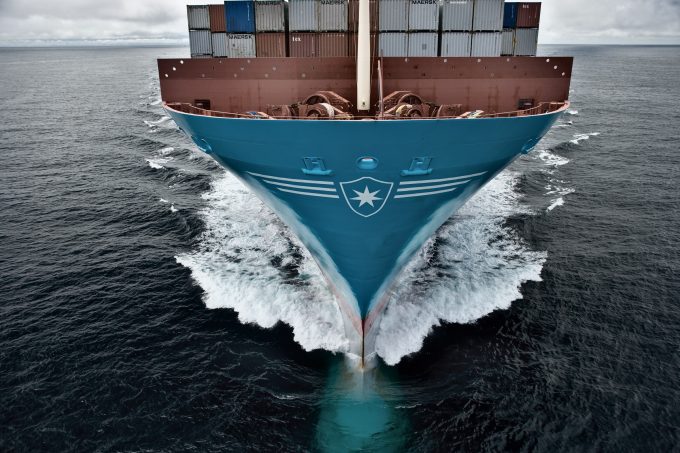Container spot rates have peaked as all major trades see prices fall
There was more evidence in this week’s container port freight markets that peak prices on ...
TFII: SOLID AS USUALMAERSK: WEAKENINGF: FALLING OFF A CLIFFAAPL: 'BOTTLENECK IN MAINLAND CHINA'AAPL: CHINA TRENDSDHL: GROWTH CAPEXR: ANOTHER SOLID DELIVERYMFT: HERE COMES THE FALLDSV: LOOK AT SCHENKER PERFORMANCEUPS: A WAVE OF DOWNGRADES DSV: BARGAIN BINKNX: EARNINGS OUTODFL: RISING AND FALLING AND THEN RISING
TFII: SOLID AS USUALMAERSK: WEAKENINGF: FALLING OFF A CLIFFAAPL: 'BOTTLENECK IN MAINLAND CHINA'AAPL: CHINA TRENDSDHL: GROWTH CAPEXR: ANOTHER SOLID DELIVERYMFT: HERE COMES THE FALLDSV: LOOK AT SCHENKER PERFORMANCEUPS: A WAVE OF DOWNGRADES DSV: BARGAIN BINKNX: EARNINGS OUTODFL: RISING AND FALLING AND THEN RISING

Shifting the maritime sector from high- to zero-carbon fuels is proving to be every bit as difficult as expected, but Maersk’s order of at least eight methanol-powered ships has been hailed as a positive move.
Hazards await the early movers into green technology with the costs extremely high, both in monetary and social terms, for failure.
But first moves need to be made and Dr Tristan Smith, of University College London (UCL)’s energy unit, explains: “There are no completely safe bets on the choice of fuels or clear strategies at this point in time. It is very encouraging to see a company take some risk and focus on a pathway and send a clear signal to the fuel suppliers and supply chains that they are looking for large volumes of low carbon fuels.
“Only through the lessons they [Maersk] learn with these ships, and the supply chains that will develop to meet their energy demands, will we be able to progress to [the point of] figuring out more clearly what the sector needs.”
According to the academic, who is also employed to help produce the International Maritime Organization’s greenhouse gas studies, Maersk is looking for a fuel that can speed up the industry’s move towards green technology, while also hoping for a helping hand from the regulators.
“I believe Maersk is keen to get moving on decarbonisation-aligned investments and has gone for methanol because it is something it can do now (when ammonia is something that is still a couple of years away at least),” said Dr Smith.
He argues that if Maersk is “primarily looking at bio-methanol as its source of fuel, it is not clear what advantage this gives over other liquid biofuels, which can be produced (including LSFO/MDO equivalents) and run in ships that it would be cheaper to build”.
He added: “It is also not clear that Maersk has a robust strategy to manage the residual value risk on these vessels, which would involve having built retrofitability to ammonia into the specification (although this remains possible).”
Methanol can be low-/very low-carbon (on a lifecycle basis) in a few different ways, including if derived as a biofuel from biomass it is dependent on the biomass process, the carrier will also need to pay close attention to the sustainability of the supply of biomass.
Moreover, as a synthesised molecule using hydrogen and CO2 feedstocks, and where the CO2 feedstock is either derived from renewable energy and air (known as direct air capture, which sucks CO2 out of the atmosphere), or from a point source of emissions that is not a fossil fuel and is sustainable such as biomass, in which case same points hold.
“It is misleading to call all of these ‘green’ methanol, because ‘green’ is a term often used with the production of hydrogen and ammonia to imply only renewable electricity has been used in the process. Only one of these three are therefore ‘green’ by that definition, and neither of the two Maersk has talked about as a fuel it will be looking to source,” explained Dr Smith.
“Maersk has just done a deal for feeder ships that focuses on the supply that is a synthesised molecule produced in combination with CO2 captured from biomass combustion. This is both expensive, and also, like the biomass pathway, not scalable, because there is a very constrained amount of biomass available globally, and there are many other end-uses which have a higher justification than shipping for the use [of the bio-fuel] – that is, they have no alternatives.
In the UCL energy unit’s analysis of low- and zero-carbon fuels, ammonia has consistently been cheaper to produce than scalable methanol – that is, methanol that only needs renewable electricity and air and water as inputs.
“So assuming Maersk is looking at these ships to run for more than a few years, it seems to be hoping there will be routes where ammonia won’t be able to be operated on, or that the costs to operate on ammonia will be so high it will be less competitive than a more expensive fuel – methanol. Or, that Maersk can lock in sufficient supplies of competitively priced bio-methanol such that this specification will be competitive against green ammonia for a good period of time,” concluded Dr Smith.
Comment on this article